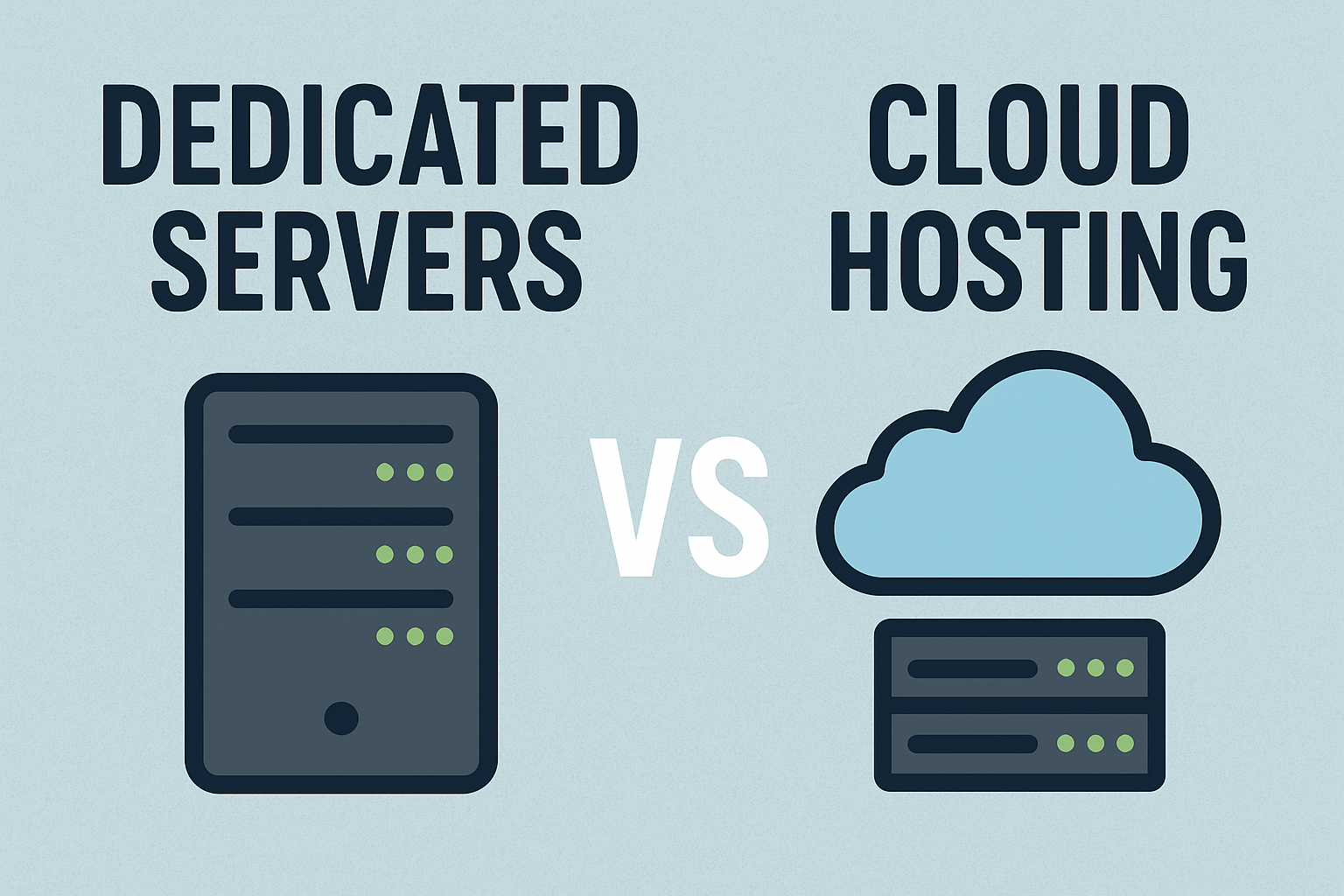When it comes to hosting applications, game servers, or enterprise workloads, one of the biggest decisions you’ll face is Dedicated Servers vs Cloud Hosting. Both have their strengths — and their drawbacks. The best choice depends on your performance needs, scaling strategy, and budget.
1. Understanding the Two Models
Dedicated Servers
A dedicated server is a physical machine rented or owned by you, hosted in a data center. All the server’s CPU, RAM, and storage are yours to use.
- Example providers: Hetzner Dedicated, OVH, Ionos
- Common specs: 64–256 GB RAM, 8–32 cores, 1–2 TB SSD storage
- Typical monthly cost: €40–€200 depending on configuration
Pros:
- High raw performance (bare-metal, no virtualization overhead)
- Fixed cost
- Complete control over hardware
Cons:
- Scaling means ordering another full server — slow and rigid
- Paying for unused capacity during off-peak hours
- Hardware failure = downtime unless you have spares
Cloud Hosting
Cloud hosting is virtualized compute resources running on a provider’s infrastructure. Instead of one fixed machine, you can have as many (or as few) instances as you need.
- Example providers: Hetzner Cloud, AWS EC2, Azure Virtual Machines
- Billing: Pay per hour or per second
- Instance sizes: From tiny 1 vCPU / 1 GB RAM to massive 64 vCPU / 512 GB RAM
Pros:
- Instant scaling — up or down in minutes
- Pay only for what you use
- Easy backups and snapshots
- Geographic flexibility — deploy in multiple regions
Cons:
- Can get expensive if scaled inefficiently
- Performance can vary due to shared infrastructure
- Egress bandwidth often costly
2. Cost Comparison — Example
Let’s compare a 64 GB RAM, 8-core server running 24/7 for one month.
| Provider & Type | Specs | Monthly Cost | Flexibility |
|---|---|---|---|
| Hetzner Dedicated AX52 | 64 GB, 8c/16t, 2×1 TB NVMe | ~€60 | None (fixed) |
| Hetzner Cloud CPX51 | 16 vCPU, 64 GB RAM | ~€82 | High |
| AWS EC2 m6i.4xlarge | 16 vCPU, 64 GB RAM | ~$550 | High |
| Azure D16as_v5 | 16 vCPU, 64 GB RAM | ~$600 | High |
Key takeaway:
Hetzner Cloud is much cheaper than AWS/Azure for the same virtual resources, but still more expensive than a dedicated server if you run it at full capacity 24/7.
3. Flexibility — Where Cloud Wins
Dedicated servers are like buying a bus: great if it’s always full, but wasteful when empty.
Cloud hosting is like hailing a ride: you pay only when you need it, and you can choose the right size vehicle every time.
Example scenario — Seasonal Game Server:
- Dedicated: Pay €60/month all year, even if it’s empty for 9 months.
- Cloud: Run a large server in peak months, a tiny one off-season — total yearly cost could be 30–50% lower.
4. When to Choose Dedicated Servers
- You have consistent high demand (e.g., enterprise workloads, big database servers)
- Need max performance without virtualization overhead
- Bandwidth-heavy applications (many dedicated providers offer unlimited traffic)
5. When to Choose Cloud Hosting
- You need autoscaling to handle unpredictable traffic spikes
- Short-term or seasonal workloads
- Want multi-region deployments
- Development, testing, and CI/CD environments
6. Hybrid Approach — Best of Both Worlds
Many companies run critical workloads on dedicated servers and use cloud instances to handle spikes or special cases. This is called cloud bursting.
Example setup:
- Primary hosting: Hetzner Dedicated Servers (low cost, high performance)
- Burst capacity: AWS EC2 or Hetzner Cloud instances during traffic peaks
Conclusion
Dedicated servers are unbeatable for raw performance per euro if your workloads are steady.
Cloud hosting wins in flexibility and rapid scaling — but comes at a premium, especially on AWS and Azure.
For many, the smart move is hybrid: use dedicated hardware for baseline needs, cloud for elasticity.
